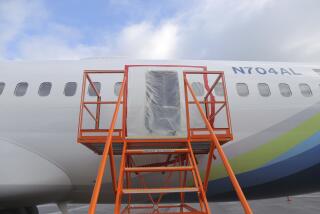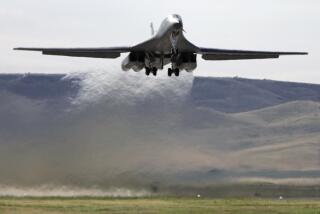Air Force Lied About B-1 Costs, GAO Study Says : Aerospace: The controversial report blasts AF accounting practices as shoddy. It also charges that there were billions in cost overruns on the F-15 and F-16 jet fighters.
- Share via
The Air Force understated its cost on the B-1 bomber by $7.5 billion and on two other aircraft programs by an additional $18 billion, according to a draft General Accounting Office report that found that the Air Force’s accounting practices have “significant internal control weaknesses.”
The GAO disclosed, for example, that when the Air Force Space Division in Los Angeles found a $2.4-billion discrepancy in its accounting books, it simply made an “unsupported and arbitrary” adjustment to get the books to balance.
The controversial report, which was the culmination of a three-year investigation, elicited a sharply worded statement by the Air Force, which “had serious disagreements with the content of the draft report and the handling of the audit. GAO’s findings are fundamentally misdirected.”
But some members of Congress reacted with outrage to the findings and vowed to hold hearings to develop new laws to strengthen the government’s financial management. Rep. John Dingell (D-Mich.), whose staff obtained and leaked an executive summary of the unpublished draft report, said the findings “would be unbelieveable had we not seen firsthand the chaos in Air Force management.”
A number of the GAO disclosures are sure to prompt serious concerns throughout Congress, including the disclosure about the cost for 100 B-1 bombers. The report states that the cost of the bomber was represented as $23 billion, but the actual cost was $7.5 billion more. If that is confirmed, it would mean the B-1 exceeded the cost cap that the Pentagon guaranteed to Congress.
In addition, the report said the F-15 jet fighter cost was understated by $8.3 billion and the F-16 was understated by $9.9 billion. The gaps are even wider when research and development is included, it said.
One specific problem is the service’s failure to track military-owned hardware that is held by defense contractors. For example, $630 million worth of satellites paid for by the Air Force but in the possession of defense contractors were “not recorded in any Air Force property or accounting system,” the report said.
The report by the GAO, which is an investigatory arm of Congress, was titled “Financial Management--Billion Dollar Decisions Made Using Inaccurate and Unreliable Air Force Data.” The GAO assigned hundreds of its auditors to the massive project.
An Air Force spokeswoman said the service received the report Feb. 1 and has not had time to respond to specific allegations. In a lengthy rebuttal, however, the service claimed the GAO attempted to apply accounting principles used by profit-making corporations. It said the GAO concept for accounting “has not been accepted by the Congress or the executive branch.”
The statement added that the report fails to recognize the Air Force’s “fund control system” used to report on the status of its funds to Congress. And the statement concludes, “The GAO report creates a faulty impression of waste and mismanagement. That perception is simply not true.” The Defense Department may be less inclined to object to the GAO findings or to future reforms, according to a knowledgeable source. Longtime internal Air Force critic A. Ernest Fitzgerald, remarked, “Missing a few billion dollars? What the hell.”
Fitzgerald, the management systems deputy in the Office of the Assistant Secretary of the Air Force for financial management, has railed for years that the defense procurement system has a “weakness in our protections against collusive fraud.” He charged that what few internal checks and balances existed in the Pentagon’s financial system were watered down by the Packard Commission reforms, implemented in an executive directive in 1986.
Julian Epstein, the staff director for the House Government Operations Committee, said, “If the report is true, it indicates very serious problems in the Air Force in terms of wasting billions of taxpayers dollars.” The committee, along with Dingell’s powerful Committee on Energy and Commerce and the House Armed Services Committee, may hold hearings.
In a letter, Dingell said the $2.4-billion accounting error committed by the Air Force Space Division is “five times the entire drug abuse education budget of the U.S. government.” Dingell called for a 10% to 15% cut in the Pentagon acquisition budget.
The GAO found that when the Air Force recently submitted financial reports to the Treasury it neglected to include $25 billion in assets and counted $10 billion in other assets twice.
The service lacks accurate data for “almost all of its non-cash assets, such as inventory, equipment, aircraft and missiles,” despite the fact that its bases represent 16% of the real property of the entire U.S. government, the GAO said.
It noted that the Air Logistics Centers, which hold inventories of spare parts, have record-keeping deficiencies that “contribute to $18 billion of inventory in excess of requirements.”
More to Read
Inside the business of entertainment
The Wide Shot brings you news, analysis and insights on everything from streaming wars to production — and what it all means for the future.
You may occasionally receive promotional content from the Los Angeles Times.











